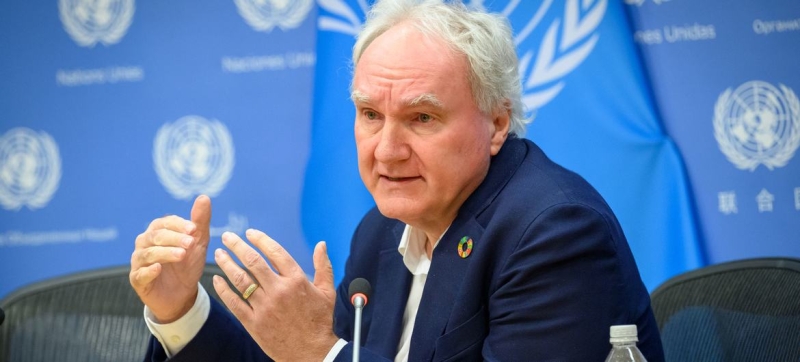
UN Resident Coordinator in Ukraine Matthias Schmale. INTERVIEW | UN Resident Coordinator in Ukraine: First of all, it is necessary to provide people with warmth Humanitarian aid
Education, health, demining, reconstruction – the 22 UN agencies currently operating in Ukraine are supporting hundreds of thousands of people, helping them overcome the catastrophic consequences of a full-scale invasion. But now, as the third winter of war approaches, the first priority is to keep people warm. This was stated in an interview with the UN News Service by the UN Resident Coordinator in Ukraine Matthias Schmale, who took up the post just under three months ago.
Matthias Schmale: Currently, about 112,000 Ukrainians live in so-called collective accommodation centers. Our focus is on supporting these people. Much of what we do is somehow related to providing people with heat. I am talking about heating devices, fuel, firewood, coal, gas and the like. Based on the experience of previous years, this year we began preparations in advance. As of September 30, we have already reached 26,000 people, they have received stoves, warm clothes, fuel, and also financial assistance. As we all know, financial assistance is a worthy form of support, it allows people to choose what to spend the money on. Markets have been disrupted near the front line, but they are functioning in most of the country. Therefore, cash assistance to support people is very effective.
UN News Service: Ukrainian officials report that all thermal power plants and almost all hydroelectric power plants in the country have stopped working. What are the consequences of this for the civilian population??
MS: Indeed, as far as I know, 60 percent of Ukraine’s own energy capacity has been partially or completely destroyed. Meanwhile, it’s getting cold. The worst consequences of the destruction of energy capacity are that people have no heating. And often no water either, because pumping stations stop working if there is no electricity. So it’s not just a question of heating, but also of access to safe water. It’s quite obvious that the destruction of energy systems has a very negative direct impact on the civilian population. Our colleagues from the Office of the UN High Commissioner for Human Rights recently published a report that talks about this in detail.
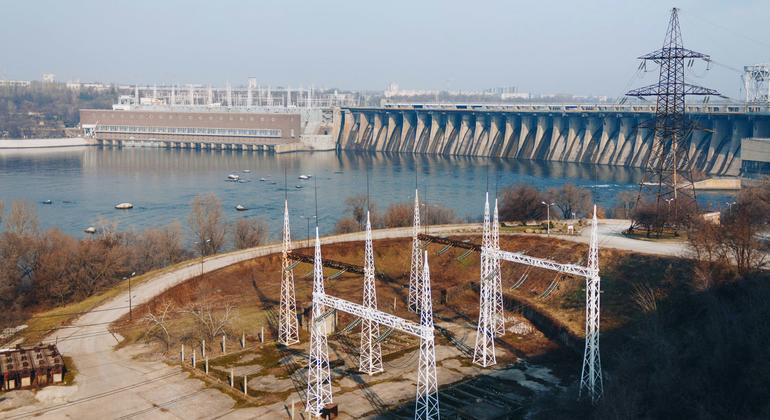
We are trying to help the Ukrainian government reach 1.8 million of the country’s most vulnerable people. There are more than three million internally displaced people in Ukraine. This week I was in the south of the country, in Odessa, Nikolaev, Kherson, and one of the problems that was often mentioned by governors and government officials is the situation of people living in multi-story buildings. They cannot be forgotten, because it is not only rural areas and settlements located along the front line that suffer from the war. Therefore, we are working to find some solutions here too.
UN News Service: What other problems are Ukraine facing today?? I know it’s hard to list them all, but please name at least the main ones.
MS: I would start with education. Hundreds of thousands, if not millions of children do not have the opportunity to study. During my trips around the country, many education officials, as well as our colleagues from UNICEF and UNESCO, noted that for school-age children, the gap in education has been almost six years old, since before the full-scale war there was also Covid. Colleagues from across the UN system are trying to help here as well. We are also trying to help equip safe classrooms in schools where they are open. I was recently in Kharkiv, where six schools are now operating in metro stations. So about five to six thousand children in Kharkiv are now studying in underground schools.
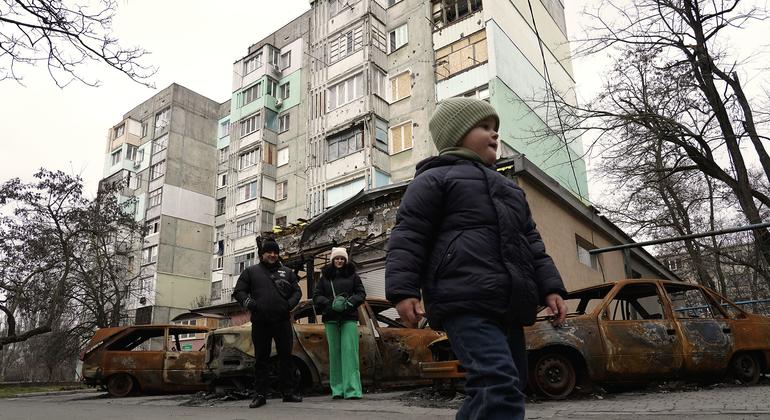
Another major issue is healthcare. Much of the healthcare infrastructure has been destroyed. My colleague from the World Health Organization (WHO) recently mentioned that we are talking about more than a thousand partially or completely destroyed health centers and hospitals. Let’s not forget that the damage to the energy sector does not only affect individuals and families who need electricity and water. Government institutions, including health facilities, also need access to energy. As far as I know from my colleagues from the WHO, after the invasion of February 22, 2022, a lot has been done not only to meet emergency health needs, help the wounded, etc., but also to maintain widespread access to primary health care.
Another issue I would like to mention is that Ukraine is currently probably the most mine-contaminated country in the world. It is mainly the front line and the areas near it. A lot of agricultural land is mined. My colleagues from other UN agencies, including the World Food Programme and the Food and Agriculture Organization, are helping to identify mined areas, to clear mines and thus help farmers to restore agricultural production.
And the last thing I would like to mention is the psychological impact on our team members. In Kyiv, where we are now, there is a pretty good defense system, so direct hits are relatively rare at the moment. But there is a huge psychological impact. There are periods when air raid sirens are going off almost every night. And, of course, we are constantly worried about whether missiles will hit the facilities we are currently building.
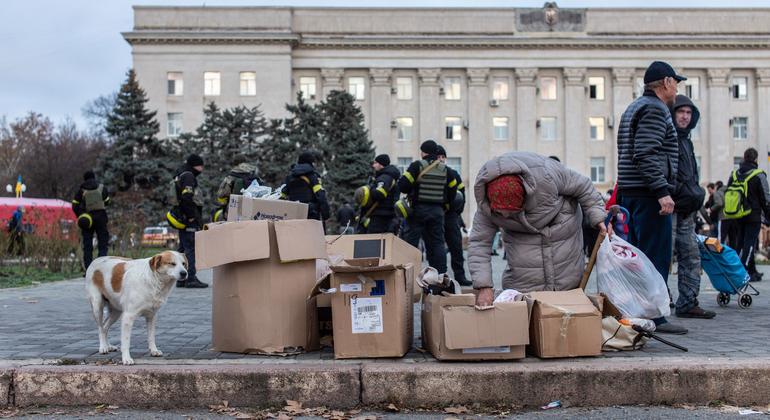
UN News Service: You’ve only been in this post for three months, but you’ve already visited many frontline cities. How do people live there and how do they manage to cope with difficulties?
MS:I don’t really like this term, but we use it a lot – I mean the resilience of the citizens of Ukraine. It’s amazing how people manage to survive in these conditions. Not only survive, but also rebuild their lives. I’ve been to many conflict zones around the world. People usually wait until the fighting is over before they seriously start rebuilding their lives and the surrounding infrastructure. Here in Ukraine, I’ve been very impressed by the determination of the citizens and the government to start rebuilding as soon as they can, even before the war is over.
Of course, it would be a mistake if I painted an exclusively rosy picture in terms of resilience. I saw desperate people and dire situations. In the Kharkiv region, I spoke to a woman who was forced to leave her home with her family. During our conversation she was close to tears several times as she talked about how they experienced the outbreak of war, how it affected their mental health, how they lived away from home for a year and then came back to find their home destroyed… So I’m not trying to paint a rosy picture. But I want to pay tribute to these people and their determination to survive and rebuild.
Earlier this week I was in Kherson, which is essentially in the middle of an active war zone. In recent weeks, the Russian Federation has been shelling it with drones, which are very accurate. The footage and photos clearly show what appear to be deliberate attacks on civilians and civilian infrastructure. Of course, these things increase fear and cause psychological trauma. People in Kherson told me that sometimes the drones don’t strike, but this hum follows them. People know that a drone is following them, but they don’t know how close it is. You can imagine what kind of psychological trauma that is.
So over the past two and a half months I have seen a lot of terrible things: all these ugly scars of war, killings, psychological trauma. War is never something pleasant, it should never be considered normal.
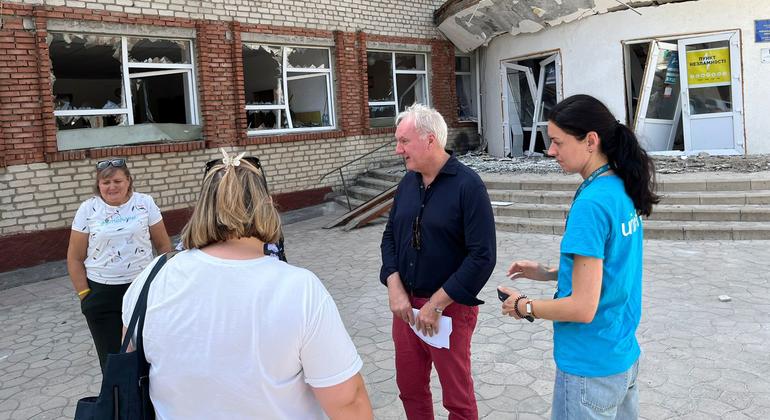
UN News Service: Any news on humanitarian access to Russian-controlled areas of Ukraine?
MS: Unfortunately, it is almost impossible to get into the territories controlled by Russia. Some things can be done, but not directly, mostly through our courageous Ukrainian partners and individuals. As far as I know, we have no presence in the territories controlled by Russia. Members of the humanitarian group regularly remind me that there are huge needs there, and we must not forget about it. But of course, to do anything meaningful in terms of humanitarian work, you need access, and right now there is virtually no access to these areas, which means that vulnerable people there are not getting the help they need.
UN News Service: How would you characterize the cooperation with the Ukrainian government in general, as well as with local authorities in the regions?
MS: I would say it is a very healthy and pragmatic cooperation. There was a turbulent period after the full-scale invasion in February 2022, when I think both the government and part of the population were not impressed with what we were doing. But I have to say that at all levels – district, regional, national – I have not met a single person who did not recognize the incredible importance of the humanitarian work carried out by the UN and its partners over the last two and a half years and more.
I must also pay tribute to my predecessor in this post, Denise Brown, who was the coordinator for almost two years and who provided visionary leadership to the humanitarian operations. She enabled the United Nations with all its components, that is, all the agencies and programmes that are on the ground, and there are now 22 of them, to have a fantastically broad presence in the country. Now, as we move forward, we hope and believe that as long as the war lasts, we will continue to provide humanitarian assistance. And that is becoming difficult because, as in many other situations, we are getting fewer and fewer resources from the international community. In terms of development and reconstruction assistance, we have yet to earn our reputation for action.
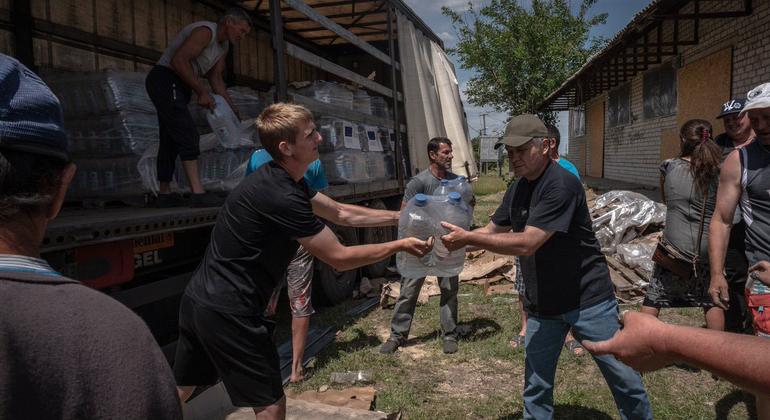
UN News Service: If I may ask a personal question… Due to the nature of your work, you have been to many conflict zones around the world. I can only imagine how hard it is to watch people suffer on such a scale. Do you have any advice on how to stay focused in such a situation?
MS:I have a few thoughts in my mind about this. The first one is that, as you well know, we have a system of rest and relaxation at the UN. We have the opportunity to go away for a week every six weeks to rest and relax. When I first left the country, I thought that maybe it was too early to take a vacation after only six weeks. But as soon as I got home, I realized how tired and exhausted I was. So I think in order to stay focused and have the inner strength to continue working despite all the horrors that are happening around us, you have to take care of your own inner and physical health.
And I must also say that I personally in Ukraine, as well as in many other places where I have worked, in Gaza and in Nigeria, am always inspired by what I said earlier – what we call the resilience of the people. For example, during my last visit to Kharkiv ten days ago, I met two wonderful Ukrainian women working for a local organization supported by our colleagues from UNFPA (the United Nations Population Fund): one is a social worker, the other is a psychologist. They told me that day after day they hear terrible stories of people who have been sexually abused on the front lines and other horrors. And, you know, I can only admire and draw energy from such people who, despite all the horrors they have to face, continue to support others with a smile on their faces. I know that many of my colleagues from the UN and other organizations admire the determination of people who experience the worst manifestations of human nature.
